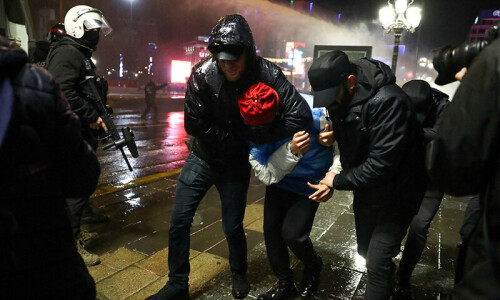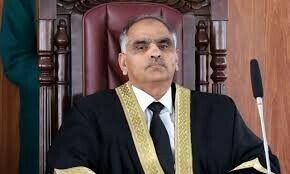KARACHI, Oct 7 Two suspected suicide bombers blew themselves up at Karachi's Abdullah Shah Ghazi shrine on Thursday, killing at least eight people and leaving more than 60 injured.
The blasts took place about half an hour after sunset in quick succession, targeting visitors, including women and children. The shrine, near the Clifton beach, is not very far from Bilawal House, a residence and camp office of President Asif Ali Zardari, where he has been staying for almost a week.
At least 12 injured people admitted to the Jinnah Postgraduate Medical Centre (JPMC) were in critical condition.
The administration, in an unprecedented step, sealed all shrines in the city as a precautionary measure.
“We have sealed shrines across the city for security purpose,” Home Minister Dr Zulfiqar Mirza told reporters at the shrine nearly an hour after the explosions.
“Let me make it very clear that we are not intimidated by such cowardly acts and the decision to seal shrines is part of strengthening security at these religious places which attract thousands of innocent people every day.”
Witnesses said the first bomber hit the main entrance, a few metres inside the shrine, moments before his accomplice blew himself up among people taking off their shoes near the stairs of the mausoleum.
“Two children are among the victims,” Sindh Health Minister Dr Sagheer Ahmed said. He said a head and limbs, probably of the bombers, had been found. There were stains of blood and flesh on the road outside the shrine. Windscreens of parked vehicles were smashed.
“I was on the stairs of the shrine and was hit by something when the second bomb exploded a few metres from the stairs,” injured Daaim Ali, one of 14 private guards deputed at the shrine along with police, said.
“The distance between the places of the two blasts was about 100 yards. There was panic and people were screaming all around. I fell down and found myself in the hospital when I gained consciousness.”
The chief of Sindh police said the blasts were, in all probability, suicide attacks.
“It's too early to reach a conclusion but we have reasons to suspect the blasts as suicide attacks,” Sultan Salahuddin Babar Khattak told Dawn.
“According to some witnesses, the attackers appeared to be teenagers. A CID team, headed by the department's chief Saud Mirza, assigned for investigations, has started collecting evidence and will come up with a report in a few days.”
The attack on the shrine of the 8th century saint came as a grim reminder of the July Data Darbar bombings in Lahore when suicide bombers attacked devotees at the mausoleum of Hazrat Ali Hajveri, popularly known as Data Ganj Bakhsh, killing more than 40 people and leaving over 100 injured.
The Sunni Tehrik, along with the Jafria Alliance and Majlis Wahdat-i-Muslimeen, announced a three-day mourning and criticised the government for not realising the level of threat to religious places.
“Had the people behind the Data Darbar attacks got the punishment they deserved, we could have avoided this latest incident,” Shakil Qadri of the Sunni Tehrik said while talking to journalists at Jinnah Hospital after meeting the injured people.
“A minority of ruthless people wants to impose its ideology over the majority of the country and we will never let it happen.”
A few hours after the blasts, scattered incidents of firing and arson took place across the city.
A youth was killed and four buses were torched. Faryal Khan, 28, was shot dead on Nishtar Road and the buses were set on fire in Garden, Saddar, Kharadar and Landhi areas.
Life came to a virtual halt in densely populated localities like Lines Area, Shah Faisal Colony and New Karachi after indiscriminate shooting forced shopkeepers to down shutters and kept traffic off roads. Fuel stations were closed and people of the affected areas stayed indoors.














































